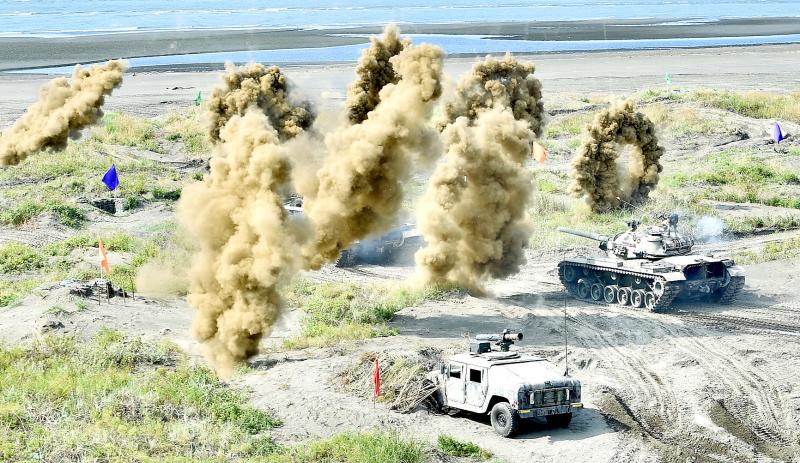The government yesterday proposed extra defense spending of NT$240 billion (US$8.66 billion) over the next five years, including on new missiles, as it warned of an urgent need to upgrade weapons in the face of “severe threats” from China.
President Tsai Ing-wen (蔡英文) has made modernizing the armed forces and increasing defense spending a priority, especially as Beijing ramps up military and diplomatic pressure against the nation.
The money, which comes on top of planned military spending of NT$471.7 billion for next year, would need to be approved by the Legislative Yuan, where Tsai’s ruling Democratic Progressive Party has a large majority, meaning its passage should be smooth.

Photo: Peter Lo, Taipei Times
“The Chinese communists have continued to invest heavily in national defense budgets, its military strength has grown rapidly, and it has frequently dispatched aircraft and ships to invade and harass our seas and airspace,” the Ministry of National Defense said in a statement after a weekly Cabinet meeting.
“In the face of severe threats from the enemy, the nation’s military is engaged in military building and preparation work, and it is urgent to obtain mature and rapid mass production weapons and equipment in a short period of time,” it added.
Deputy Minister of National Defense Wang Shin-lung (王信龍) said the new weapons would be made domestically, as the nation boosts its production prowess, although the US would probably remain an important parts and technology provider.

Photo: Ritchie B. Tongo, EPA-EFE
Taiwan has been keen to demonstrate that it can defend itself, especially amid questions about whether the US would come to its aid if China attacked.
Premier Su Tseng-chang (蘇貞昌) said during the Cabinet meeting that there was great need to augment the military’s combat capabilities, especially for the naval and air force branches.
The special budget has prioritized domestically produced armaments, which could lead to increased corporate investment in the national defense supply chain, creating a win-win scenario for boosting economic growth and autonomous national defense production capabilities, Su said.
The weapons it aims to buy include cruise missiles and warships, the ministry said.
Eight categories of missiles are to be built domestically as part of the budget, Wang said.
They include coastal anti-surface missile systems; the Antelope air defense system; the Tien Kung III (Sky Bow III) land-based surface-to-air missile; an attack drone system; the Wan Chien (Thousand Swords) missile system and the Hsiung Feng IIE (Brave Wind) missile system, he said.
The special budget also calls for the installation of combat systems on Coast Guard Administration ships and continuing the Indigenous Shipbuilding Program, he added.
All items are considered critical if the military is to rapidly build up its combat capabilities, Wang said.
The ministry would provide more details on each item during a budget review, he added.
The announcement came as Taiwan is in the middle of its annual Han Kuang military exercises, which began on Monday and are to end today.
The army yesterday simulated fending off an invasion, firing artillery from a beach on the southern coast.
The exercises, Taiwan’s major war games, have been held annually since 1984, in the form of live-fire drills and computerized war games, to test the military’s combat readiness in the face of a possible Chinese invasion.
Additional reporting by CNA

CHAOS: Iranians took to the streets playing celebratory music after reports of Khamenei’s death on Saturday, while mourners also gathered in Tehran yesterday Iranian Supreme Leader Ayatollah Ali Khamenei was killed in a major attack on Iran launched by Israel and the US, throwing the future of the Islamic republic into doubt and raising the risk of regional instability. Iranian state television and the state-run IRNA news agency announced the 86-year-old’s death early yesterday. US President Donald Trump said it gave Iranians their “greatest chance” to “take back” their country. The announcements came after a joint US and Israeli aerial bombardment that targeted Iranian military and governmental sites. Trump said the “heavy and pinpoint bombing” would continue through the week or as long

TRUST: The KMT said it respected the US’ timing and considerations, and hoped it would continue to honor its commitments to helping Taiwan bolster its defenses and deterrence US President Donald Trump is delaying a multibillion-dollar arms sale to Taiwan to ensure his visit to Beijing is successful, a New York Times report said. The weapons sales package has stalled in the US Department of State, the report said, citing US officials it did not identify. The White House has told agencies not to push forward ahead of Trump’s meeting with Chinese President Xi Jinping (習近平), it said. The two last month held a phone call to discuss trade and geopolitical flashpoints ahead of the summit. Xi raised the Taiwan issue and urged the US to handle arms sales to

BIG SPENDERS: Foreign investors bought the most Taiwan equities since 2005, signaling confidence that an AI boom would continue to benefit chipmakers Taiwan Semiconductor Manufacturing Co’s (TSMC, 台積電) market capitalization swelled to US$2 trillion for the first time following a 4.25 percent rally in its American depositary receipts (ADR) overnight, putting the world’s biggest contract chipmaker sixth on the list of the world’s biggest companies by market capitalization, just behind Amazon.com Inc. The site CompaniesMarketcap.com ranked TSMC ahead of Saudi Aramco and Meta Platforms Inc. The Taiwanese company’s ADRs on Tuesday surged to US$385.75 on the New York Stock Exchange, as strong demand for artificial intelligence (AI) applications led to chip supply constraints and boost revenue growth to record-breaking levels. Each TSMC ADR represents

State-run CPC Corp, Taiwan (CPC, 台灣中油) yesterday said that it had confirmed on Saturday night with its liquefied natural gas (LNG) and crude oil suppliers that shipments are proceeding as scheduled and that domestic supplies remain unaffected. The CPC yesterday announced the gasoline and diesel prices will rise by NT$0.2 and NT$0.4 per liter, respectively, starting Monday, citing Middle East tensions and blizzards in the eastern United States. CPC also iterated it has been reducing the proportion of crude oil imports from the Middle East and diversifying its supply sources in the past few years in response to geopolitical risks, expanding